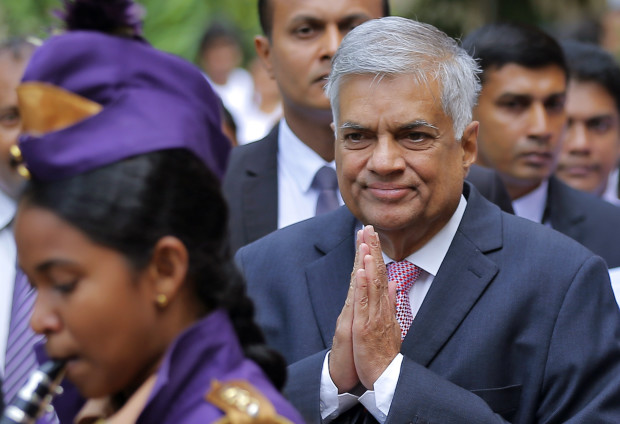Sri Lankan lawmakers approve freedom of information law

Sri Lankan Prime Minister Ranil Wickremesinghe attends an event before going to Parliament for discussion and probable vote on a bill presented by him on right to information in Colombo, Sri Lanka, on June 24. AP
COLOMBO, Sri Lanka—Sri Lankan lawmakers unanimously approved a law on Friday giving citizens the right to demand public information, a move many hope will restore transparency and good governance to a nation long plagued by corruption and misrule.
The country’s 225-member Parliament approved the Right to Information Act without calling for a vote after two days of debate.
The law gives citizens access to public information except personal data, information relating to national security, financial and commercial policy decisions, intellectual property and medical reports. Information can also be withheld if its release is deemed to violate parliamentary privileges.
“This is landmark legislation that strengthens the fundamental rights of the people of the country,” ruling coalition lawmaker Jayampathy Wickramaratne said after the law’s passage.
Sri Lanka has a long history of official secrecy. Information has frequently reached the public only through the leaking of documents to the media, and in recent years the government has cracked down on that as well. The bill, a longstanding demand from journalists and activists, is part of reforms President Maithripala Sirisena promised before winning the 2015 presidential election. Under his predecessor, Mahinda Rajapaksa, access to government information was greatly limited and journalists were regularly threatened, attacked or even killed.
At least 95 countries have some form of freedom of information laws on their books, according to Right2Info, a website launched by the Open Society Justice Initiative. Still, enforcement varies considerably and some of those governments routinely ignore or refuse information requests.
Presenting the freedom of information bill to Parliament on Thursday, Prime Minister Ranil Wickremesinghe said the lack of such legislation led to large-scale corruption and financial losses to the country through questionable deals.
Media and Information Minister Gayantha Karunatillaka said 4,000 state institutions will be covered by the law and 8,000 officials will be trained to handle information requests. The government says it will take about one year to complete logistics and training and for the law to become fully operational.
“This is a huge victory for a nation that had nothing of this sort,” said K.W. Janaranjana, an activist lawyer and newspaper editor.
He said the law will take time to fulfill its potential. “It is not enough bringing in laws; we have to build up an information culture. People are not used to it so we must encourage them to practice this frequently.”
Leading lawyer and ethnic Tamil lawmaker M.A. Sumanthiran said the law probably will not be helpful in answering questions from the country’s quarter-century civil war, even though it doesn’t explicitly exclude such requests. Tens of thousands of people remain missing from the war, which ended in 2009, and others have been denied access to property seized during the fighting.
“What is contemplated through the RTI (law) is not this kind of information,” he said.
Pakiyasothy Saravanamuttu, head of the local think tank Center for Policy Alternatives, said information related to the civil war can be denied, citing exceptions under national security, but people should use every opportunity to test it.
The law requires an information officer to decide whether to release or withhold requested information within 14 working days and to share the information within the next 14 days. People seeking information who are dissatisfied by those decisions have three levels of appeal.
A five-member Right to Information Commission will be set up to monitor and ensure compliance, and will have powers to hold inquiries and hear appeals.
The act proposes fines and jail terms for officials who deliberately refuse applications, refuse to release shareable information or destroy or distort information in their custody.














